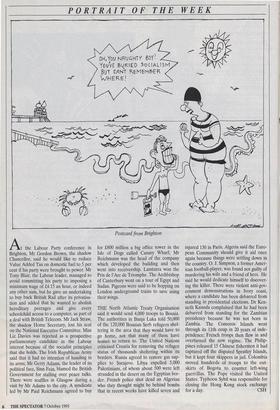PORTRAIT OF THE WEEK
Postcard from Brighton At the Labour Party conference in Brighton, Mr Gordon Brown, the shadow Chancellor, said he would like to reduce Value Added Tax on domestic fuel to 5 per cent if his party were brought to power. Mr Tony Blair, the Labour leader, managed to avoid committing his party to imposing a minimum wage of £4.15 an hour, or indeed any other sum, but he gave an undertaking to buy back British Rail after its privatisa- tion and added that he wanted to abolish hereditary peerages and give every schoolchild access to a computer, as part of a deal with British Telecom. Mr Jack Straw, the shadow Home Secretary, lost his seat on the National Executive Committee. Miss Liz Davies was rejected as a prospective parliamentary candidate in the Labour interest because of the socialist principles that she holds. The Irish Republican Army said that it had no intention of handing in its arms; Mr Gerry Adams, the leader of its political face, Sinn Fein, blamed the British Government for stalling over peace talks. There were scuffles in Glasgow during a visit by Mr Adams to the city. A syndicate led by Mr Paul Reichmann agreed to buy for £800 million a big office tower in the Isle of Dogs called Canary Wharf; Mr Reichmann was the head of the company which developed the building and then went into receivership. Lamtarra won the Prix de l'Arc de Triomphe. The Archbishop of Canterbury went on a tour of Egypt and Sudan. Pigeons were said to be hopping on London underground trains to save using their wings.
THE North Atlantic Treaty Organisation said it would send 4,000 troops to Bosnia. The authorities in Banja Luka told 50,000 of the 120,000 Bosnian Serb refugees shel- tering in the area that they would have to go home, not that many of them have homes to return to. The United Nations criticised Croatia for removing the refugee status of thousands sheltering within its borders. Russia agreed to restore gas sup- plies to Sarajevo. Libya expelled 5,000 Palestinians, of whom about 500 were left stranded in the desert on the Egyptian bor- der. French police shot dead an Algerian who they thought might be behind bombs that in recent weeks have killed seven and injured 130 in Paris. Algeria said the Euro- pean Community should give it aid once again because things were settling down in the country. 0. J. Simpson, a former Amer- ican football-player, was found not guilty of murdering his wife and a friend of hers. He said he would dedicate himself to discover- ing the killer. There were violent anti-gov- ernment demonstrations in Ivory coast, where a candidate has been debarred from standing in presidential elections. Dr Ken- neth Kaunda complained that he had been debarred from standing for the Zambian presidency because he was not born in Zambia. The Comoros Islands went through its 11th coup in 20 years of inde- pendence; French troops then flew in and overturned the new regime. The Philip- pines released 15 Chinese fishermen it had captured off the disputed Spratley Islands, but it kept four skippers in jail. Colombia moved hundreds of troops to the out- skirts of Bogota to counter left-wing guerrillas. The Pope visited the United States. Typhoon Sybil was responsible for closing the Hong Kong stock exchange










































































 Previous page
Previous page